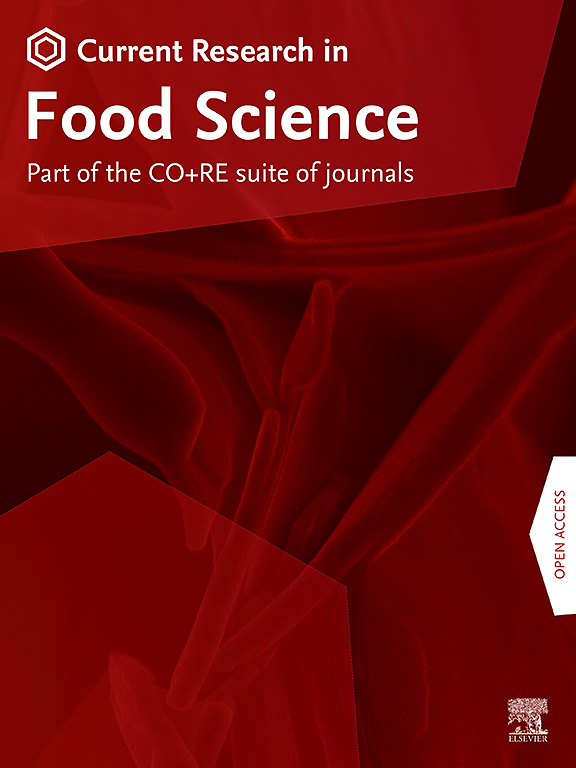Selenium enrichment enhances the alleviating effect of Lactobacillus rhamnosus GG on alcoholic liver injury in mice
IF 7
2区 农林科学
Q1 FOOD SCIENCE & TECHNOLOGY
引用次数: 0
Abstract
Selenium-enriched probiotics have attracted much attention due to the physiological activities of both probiotics and selenium (organic selenium). In this study, we investigated the mitigating effect of selenium-enriched Lactobacillus rhamnosus GG (LGG@Se) and its pathway on alcohol-induced liver injury (ALI) in mice. The results showed that LGG@Se was superior to LGG and sodium selenite in alleviating ALI. Oral LGG@Se effectively prevented lipid metabolism disorders and liver oxidative damage in mice caused by excessive alcohol intake. 16S amplicon sequencing showed that LGG@Se intervention increased the abundance of beneficial bacteria and suppressed the growth of harmful bacteria in the intestinal tract of over-drinking mice, and thus effectively modulated the homeostasis of intestinal flora, which were highly correlated with the improvement of liver function. Liver metabolomics analysis indicated that LGG@Se intervention altered liver metabolic profiling, and the characteristic biomarkers were mainly involved in amino acid metabolism, including alanine, aspartate and glutamate metabolism, arginine biosynthesis, etc. In addition, LGG@Se intervention modulated the expression of genes and proteins related to lipid metabolism and oxidative stress in liver of over-drinking mice. Western blot analysis revealed that LGG@Se intervention up-regulated the expression of intestinal barrier function-related proteins, thereby ameliorating alcohol-induced intestinal barrier damage. Collectively, these findings provide scientific evidence that LGG@Se possesses the biological activity of improving alcohol-induced lipid metabolism and intestinal microbiota disorder.

富硒可增强鼠李糖乳杆菌GG对小鼠酒精性肝损伤的缓解作用。
富硒益生菌因其与硒(有机硒)同时具有生理活性而备受关注。本研究探讨富硒鼠李糖乳杆菌GG (LGG@Se)对小鼠酒精性肝损伤的缓解作用及其途径。结果表明LGG@Se对ALI的缓解效果优于LGG和亚硒酸钠。口服LGG@Se可有效预防过量饮酒引起的小鼠脂质代谢紊乱和肝脏氧化损伤。16S扩增子测序结果显示LGG@Se干预增加了过量饮酒小鼠肠道有益菌的丰度,抑制了有害菌的生长,从而有效调节了肠道菌群的稳态,与肝功能的改善高度相关。肝脏代谢组学分析表明LGG@Se干预改变了肝脏代谢谱,特征生物标志物主要涉及氨基酸代谢,包括丙氨酸、天冬氨酸和谷氨酸代谢、精氨酸生物合成等。此外,LGG@Se干预可调节过量饮酒小鼠肝脏脂质代谢和氧化应激相关基因和蛋白的表达。Western blot分析显示LGG@Se干预上调肠屏障功能相关蛋白的表达,从而改善酒精诱导的肠屏障损伤。总之,这些发现提供了科学证据,证明LGG@Se具有改善酒精诱导的脂质代谢和肠道微生物群紊乱的生物活性。
本文章由计算机程序翻译,如有差异,请以英文原文为准。
求助全文
约1分钟内获得全文
求助全文
来源期刊

Current Research in Food Science
Agricultural and Biological Sciences-Food Science
CiteScore
7.40
自引率
3.20%
发文量
232
审稿时长
84 days
期刊介绍:
Current Research in Food Science is an international peer-reviewed journal dedicated to advancing the breadth of knowledge in the field of food science. It serves as a platform for publishing original research articles and short communications that encompass a wide array of topics, including food chemistry, physics, microbiology, nutrition, nutraceuticals, process and package engineering, materials science, food sustainability, and food security. By covering these diverse areas, the journal aims to provide a comprehensive source of the latest scientific findings and technological advancements that are shaping the future of the food industry. The journal's scope is designed to address the multidisciplinary nature of food science, reflecting its commitment to promoting innovation and ensuring the safety and quality of the food supply.
 求助内容:
求助内容: 应助结果提醒方式:
应助结果提醒方式:


